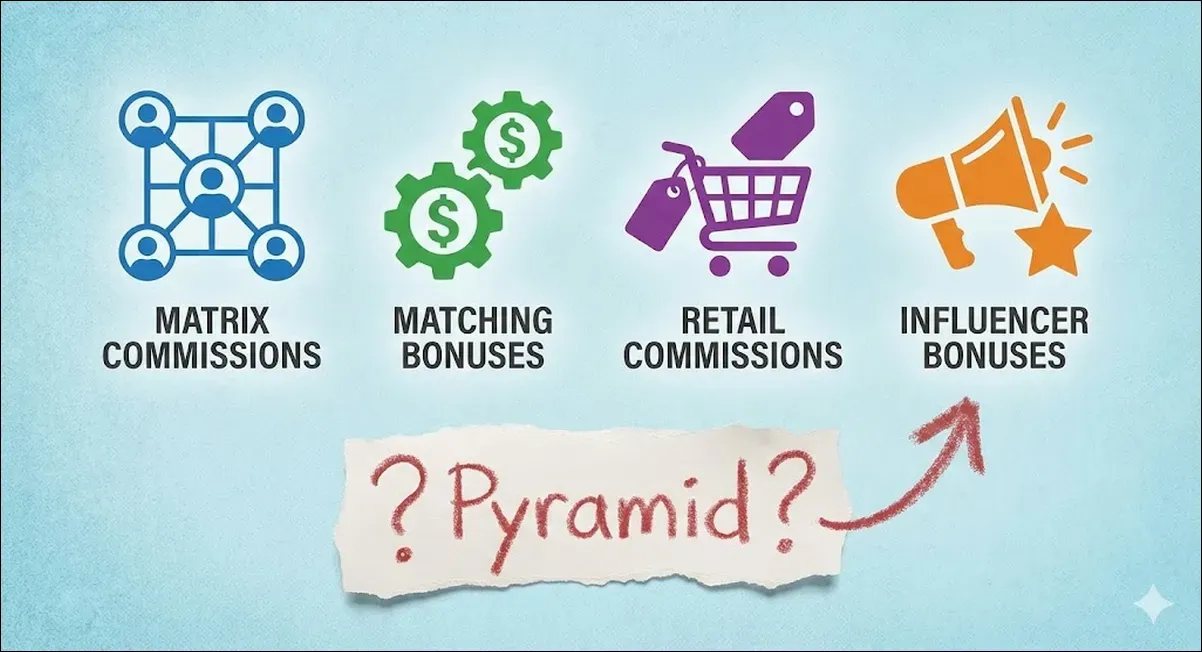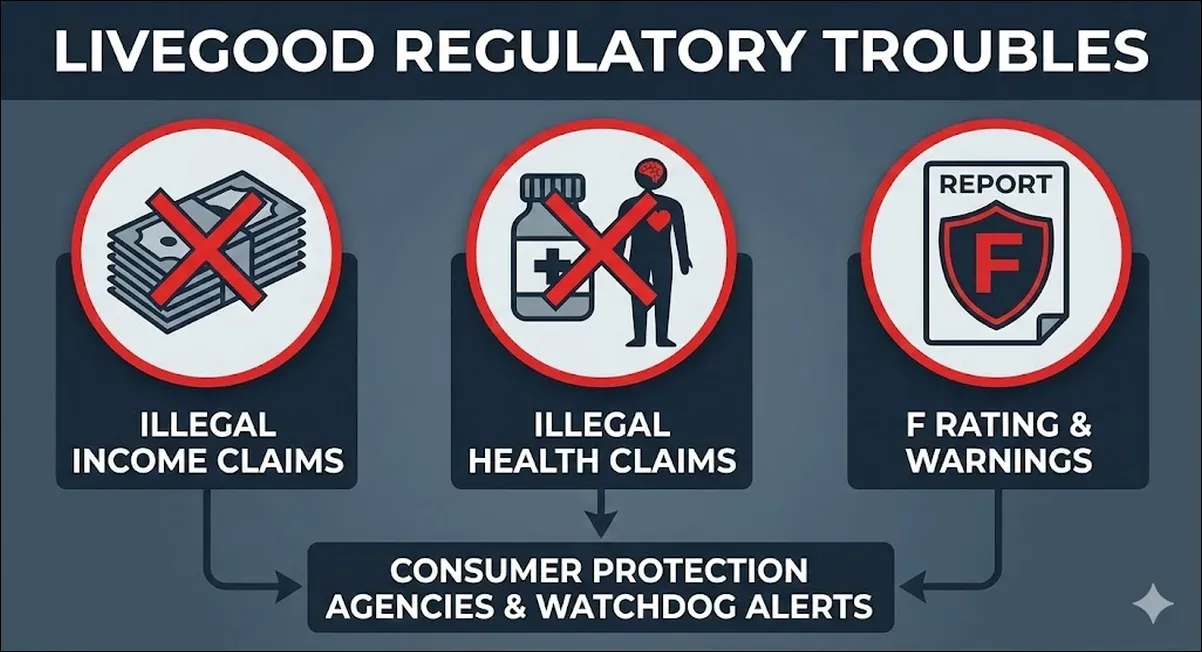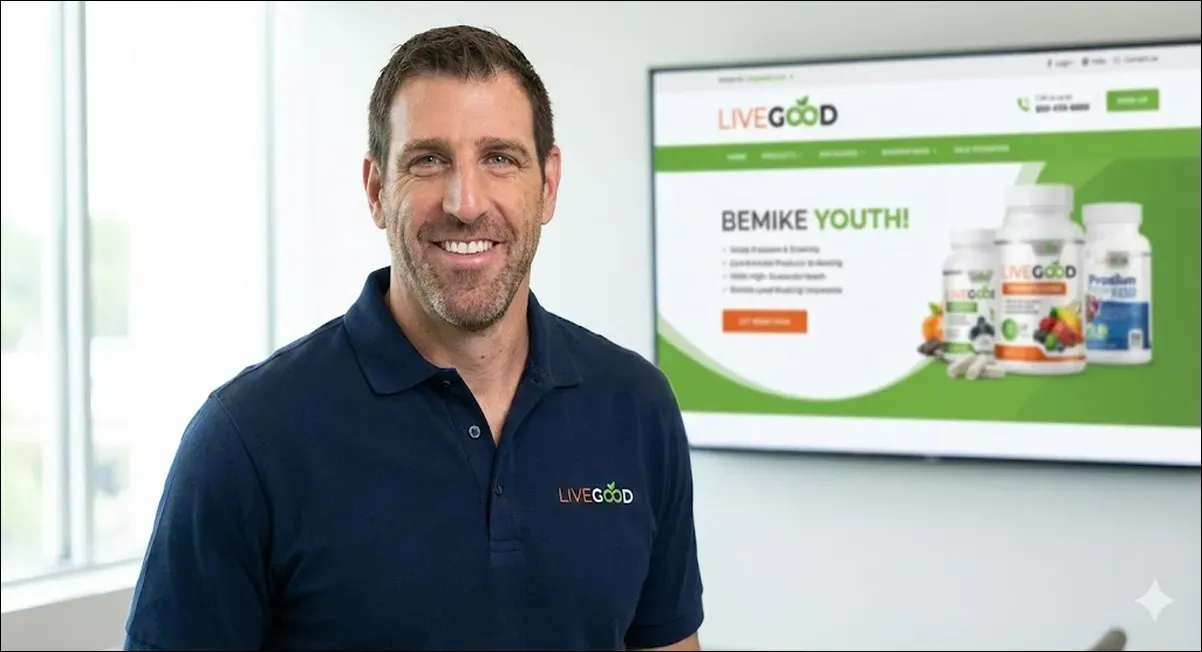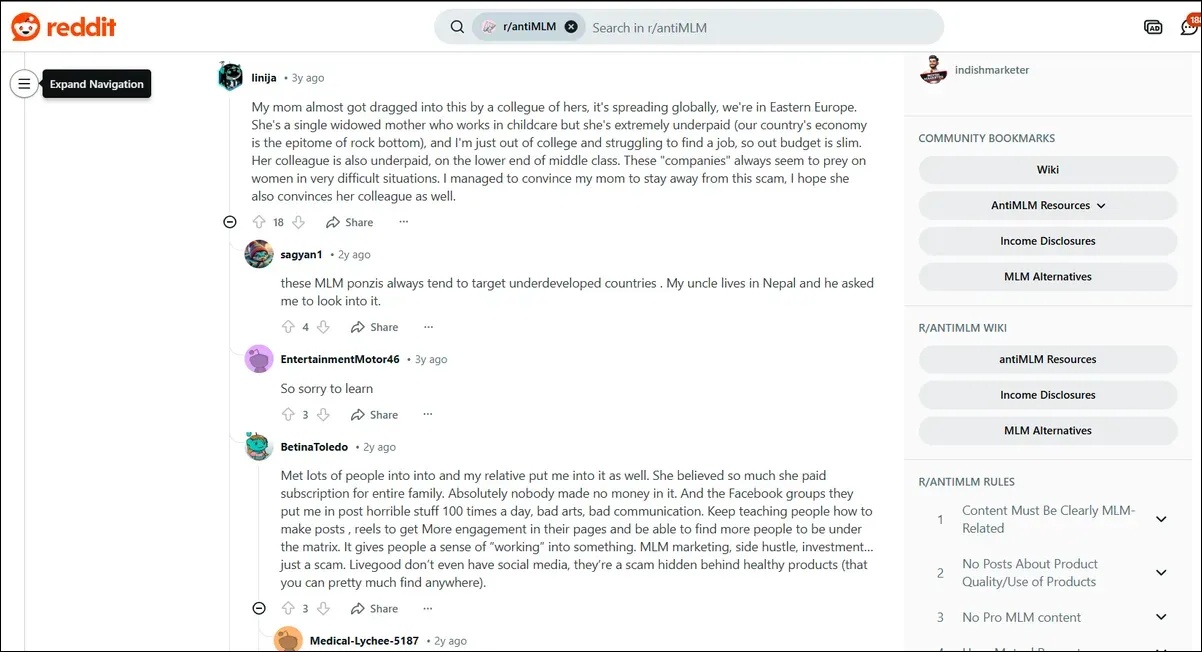Is LiveGood Another MLM Scam? Here's What I Found
People keep asking me, "Is LiveGood MLM a scam?" so I did some real digging. What I found was pretty shocking - regulatory warnings, an F rating from BBB, and founders with a history of dissolved MLM companies.

So I've been getting a lot of questions about LiveGood MLM lately. People keep asking me, "Is LiveGood a scam?" and honestly, I wasn't sure what to think at first. The company seems pretty popular, and their products look decent, but there's been so much talk online about it being a pyramid scheme.
I decided to dig deep and do some real research to find out the truth. What I discovered was pretty shocking, and I think you need to know about it before you consider joining or buying anything from them.
This blog post is based on publicly accessible information. You can view all sources here: https://docs.google.com/document/d/15JE1HDINSAuZ3RpXSC5l4LIDyZEsTZog6uJHhhLHdf8/edit?usp=sharing
LiveGood At A Glance
- Founded: 2022, Jupiter, Florida
- Model: Monthly membership for “wholesale” prices
- Costs: $40 one-time affiliate fee + $9.95 monthly membership
- Products: Greens, Reds, coffee, multivitamins, protein, CBD, skin care
- Claims: USA-made, GMP-certified, some items USDA organic via third-party manufacturer
- Key question: Is money made from real customers or from recruiting people who pay the fee?
- Alternatives: OLSP System & Wealthy Affiliate
What is LiveGood MLM?

LiveGood is a multi-level marketing company that started in 2022. They're based in Florida, and they sell health supplements and wellness products. The company is run by Ben Glinsky (the CEO) and Nauder Khazan (Director of Field Development).
Their big selling point is what they call the "Costco model" - basically, you pay a $9.95 monthly membership fee to access their products at wholesale prices. If you want to make money with them, you also pay a one-time $40 affiliate fee.
They claim their products are high-quality and much cheaper than competitors. The company says they reached one million members in just 13 months, which sounds pretty impressive.
The company says it uses quality ingredients and follows GMP. It says some items, like Super Greens and Super Reds, are USDA organic through a third-party maker. They also say products are lab tested. These are company claims. We still need outside data.
But here's where things get interesting...
The Problem With Their Business Model
After looking at their compensation plan really carefully, I found some major red flags. The way LiveGood makes money for its affiliates is mostly through recruiting new people, not selling products to regular customers.

Here's how their main income streams work:
- Fast Start Commissions: When you get someone to join (paying that $40 + $9.95 fee), you get $25 right away. That's a 50% kickback just for bringing someone in.
- Matrix Commissions: This is where it gets really questionable. They put everyone in something called a "2x15 matrix," and you earn money from the monthly fees that other people pay. You can supposedly earn up to $2,047.50 per month "without recruiting anyone" just from this matrix.
- Matching Bonuses: You get 50% of what the people you recruit earn from their matrices. So if someone you brought in makes $1,000, you get $500.
The problem is obvious. Almost all the money comes from membership fees that participants pay, not from selling products to outside customers. This is exactly what regulators look for when they're trying to identify pyramid schemes.
Some more parts of the plan
- Retail commissions. You earn a cut of the spread when non-members buy at retail.
- Influencer bonuses. Extra pay if you move a very high retail volume.
- Customer acquisition bonus. A small cut on a new member's first order.
- Diamond pools. The top ranks share a small percentage of the company's sales. These ranks need thousands of active members.
| Earning method | What triggers pay | What it really rewards |
|---|---|---|
| Fast Start | New $49.95 sign ups | Recruiting |
| Matrix | $0.25 per member per month | Company-wide recruiting growth |
| Matching bonus | % of your recruits’ matrix pay | Recruiting recruiters |
| Retail commission | Spread on non-member sales | Real retail |
| Influencer bonus | Big monthly retail volume | High retail only |
| Customer bonus | First order by a new member | Tied to recruiting |
| Diamond pools | Hit top rank with huge team | Massive recruiting |
The monthly fee is $9.95. Matrix pays about $0.25 per person each month. You need about 40 people under you to cover $9.95. The first-year fee plus sign-up is about $160. Fast Start is $25 per new person. You need about seven sign-ups to cover that first year. Most people never do that. So most people lose money.
The Regulatory Problems Keep Piling Up
This is where things get really concerning for LiveGood. They've been in trouble with regulators multiple times already.

The Direct Selling Self-Regulatory Council (that's part of the Better Business Bureau) has investigated LiveGood twice - once in 2024 and again in 2025. Both times, they found that LiveGood affiliates were making illegal claims about:
- How much money can you make ("financial freedom," "earn thousands without doing anything")
- Health benefits of their products (claiming they treat cancer, diabetes, stroke, and other serious diseases)
When the regulators asked LiveGood to prove these claims, the company couldn't provide any evidence. Even worse, in the most recent investigation, LiveGood refused to commit to following the regulatory recommendations.
And here's the kicker - LiveGood has an "F" rating from the Better Business Bureau. Why? Because they don't respond to customer complaints. They've had 15 complaints filed against them and ignored 13 of them completely.
The Founders' Sketchy History
This part really surprised me. When I looked into the backgrounds of the founders, I found some troubling patterns.
Ben Glinsky was previously involved with a company called Brain Abundance Ltd. Guess what? That company is now dissolved.

Nauder Khazan had his own MLM called AliveMax Ltd. That company is also dissolved.
So both founders have a history of starting MLM companies that end up shutting down. This suggests they might be serial MLM creators who capitalize on the initial growth phase and then move on to the next venture when things start falling apart.
What People Are Actually Saying
I spent time reading reviews and testimonials from both sides, and there's a huge divide.
The positive reviews all come from people who are actively promoting LiveGood and trying to recruit others. These are people who have a financial incentive to make the company look good.
The negative reviews come from independent sources, consumer forums, and people who've tried the business opportunity and lost money. On Reddit's anti-MLM community, people are calling LiveGood an "obvious scheme" and a "product-based pyramid."

Many critics point out that very few people actually make money, and most can't even earn back their initial $49.95 investment plus the monthly fees.
The Bottom Line: Is LiveGood a Scam?
Based on everything I found, I have to say yes - the evidence strongly suggests that LiveGood operates as a pyramid scheme.

Here's why:
- The compensation plan primarily rewards recruitment, not product sales
- Regulators have repeatedly cited them for illegal marketing claims
- They have an F rating from the BBB for ignoring customer complaints
- The founders have a history of dissolved MLM ventures
- The business model matches the legal definition of a pyramid scheme
The "Costco model" narrative is basically a marketing trick to make people think they're joining a legitimate wholesale club, when really they're paying to participate in a recruitment scheme.
What This Means for You

If you're thinking about joining LiveGood, please be very careful. The math just doesn't work out for most people. You're much more likely to lose money than make it.
The products might be decent quality, but you can probably find similar supplements elsewhere without having to pay monthly membership fees or getting pressured to recruit your friends and family.
If someone is trying to recruit you into LiveGood, remember that they have a financial incentive to get you to join. Their testimonials about making money are basically sales pitches, not objective reviews.
FAQ
- Can I make $2,047 with no recruiting?
It needs a full 2x15 matrix from spillover. That is not typical. - Is LiveGood officially called a pyramid scheme?
No. But the pay plan design is high risk under the FTC test. - What are the real costs?
$40 once. $9.95 every month. More if you buy products. - Are the products good?
The company says yes. There is a Prop 65 notice for lead on one product.
Final Thoughts
I know this might disappoint some people who were hoping LiveGood would be different. I wanted to give them the benefit of the doubt, too. But the evidence is pretty clear. This follows the same pattern as other MLM schemes that have gotten in trouble with regulators.
The health and wellness industry is full of legitimate companies that sell good products without requiring you to pay membership fees or recruit others. I'd recommend sticking with those instead.
Stay safe out there, and always do your research before joining any MLM or "business opportunity."
What do you think? Have you had any experiences with LiveGood or similar companies? I'd love to hear your thoughts in the comments below.